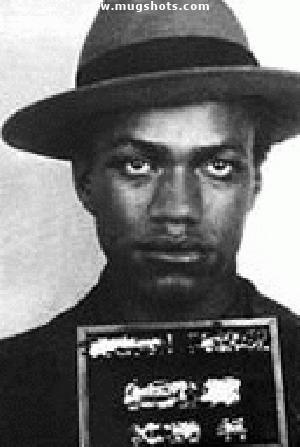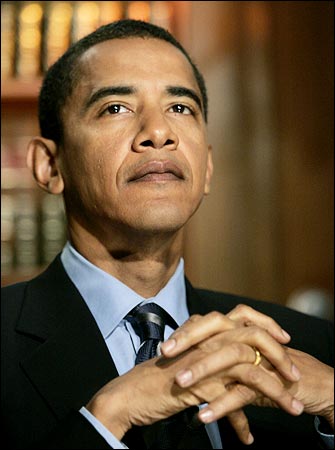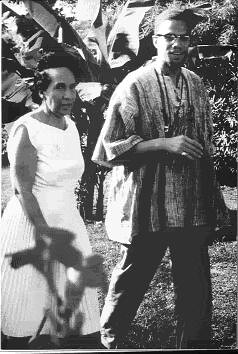

Like Father, Like Son.
I swore I would never see the Movie Malcom X but I recently got it on DVD and watched it. It is a real eye opener as to the similarities of these two.
Thanks Fred for all your work.
Posted on 06/24/2009 10:54:57 PM PDT by neverdem
Had Americans been able to stop obsessing over the color of Barack Obama's skin and instead paid more attention to his cultural identity, maybe he would not be in the White House today. The key to understanding him lies with his identification with his father, and his adoption of a cultural and political mindset rooted in postcolonial Africa.


I swore I would never see the Movie Malcom X but I recently got it on DVD and watched it. It is a real eye opener as to the similarities of these two.
Thanks Fred for all your work.
Thanks, the story will continue. I’ll ping to the next episode.
thanks, I will ping you to the next episode.
Given the number of so-called "Constitutional scholars" who seem to be out to destroy rather than understand and preserve the Constitution, I'm developing a real suspicion of this group of people.
Fred,
Thank you for your diligent research on this.
Please add me to your ping list.
Thanks.
God Save America!
Wolverines!!!!
Then I gave it a bit of thought.
No afro-marxist despot would stop at the lowly rank of Colonel, bammy would have to be a General at the very least, but with his hyperinflated ego Field Marshal would be much more likely.
All hail Field Marshal and President for life, hussein I.
/retch
Thank you for the research, links and info. Nice job!
Kenyan Student Airlift. The Frank Marshall Davis Network.Obama Snr. US expats/Ghana
GHANA POST IDEPENDENCE POLITICS.
-----------------END RECAP. STORY CONTINUES:
Pages From History: Malcolm X When He Came To Ghana In 1964

Malcolm X of the Muslim Mosque, Inc. and Shirley Graham DuBois, Director of Ghana National Television, at her villa in Accra, Ghana during Malcolm's visit in May 1964. DuBois had thrown a reception in his honor.
The Making Of A Pan-African: Kwame Nkrumah In America
"...In his autobiography, Ghana, Nkrumah recalled that he acquainted himself “with as many political organizations that I could”—that is, groups concerned with black rights and Africa—including the National Urban League and the NAACP.
It was the latter’s special research office that would prove most significant to his pan-African future. It was headed by the brilliant scholar Dr. W. E. B. DuBois, a co-founder of the NAACP, founder and longtime editor of its organ, The Crisis.
Du Bois has been called the “Father of Pan-Africanism” in the 20th century (though Trinidadian barrister Henry Sylvester Williams, convener of the first Pan-African Conference in 1900, has a better claim to the title).
Nkrumah met DuBois near the end of his sojourn in America, about the time the elder intellectual returned to the NAACP after breaking with it a decade earlier over his advocacy of temporary “self-segregation.” Keenly interested in the possibilities for colonial freedom in the wake of the Second World War and the creation of the United Nations, DuBois considered the special research office as “sort of a foreign affairs department of the NAACP.”
Nkrumah also worked with the Council on African Affairs, co-founded by African American social worker Max Yergen and the renaissance man of the 20th century, Paul Robeson...
~SNIP
"...In April 1945, he helped the venerable DuBois organize an international “Colonial Conference” at the old Schomburg Library in Harlem. This little-known conclave was something of a dress rehearsal for the historic Fifth Pan-African Congress, which both men helped to mount in Manchester, England, in October of that year.
One of the continental Africans who assisted them would become yet another father of an African nation: Jomo Kenyatta, known as Mzee (“wise old man”), later the first president of independent Kenya.
Synthesis
Though close to DuBois, Nkrumah also found inspiration in one of his mentor’s old nemeses—the president-general of the Universal Improvement Association and the African Communities League of the World (UNIA-ACL), the largest black mass movement in modern times, a man considered by millions to be a “Black Moses.”
In a famous passage from his autobiography, Nkrumah recalled: “But I think that of all the literature that I studied, the book that did more than any other to fire my enthusiasm was Philosophy and Opinions of Marcus Garvey. Garvey, with his philosophy of ‘Africa for the Africans’ and his ‘Back to Africa’ movement, did much to inspire the Negroes of America in the 1920’s.”
Thus, this young continental African embraced the two great streams of Western pan-Africanism: Garvey’s global nationalist vision of “Africa for the Africans, those at home and those abroad,” and DuBois’ continental vision of a socialist Africa.
In time, Nkrumah would achieve something that neither of these historic rivals would likely have contemplated or approved—a novel synthesis of their competing, yet not wholly uncomplimentary, visions of a free, united, and socialist African nationality.
African American Imprint
After Ghana became independent, Nkrumah expressed his profound debt to Garvey and DuBois.
He resurrected and made ubiquitous the UNIA’s black star symbol. Ghana’s capital square, the old polo grounds, bore its name, and the symbol sat in the center of the nation’s flag. Moreover, the flag’s colors were based on the UNIA’s red, black and green standard.
An even more direct link was the Black Star Steamship Line, named after Garvey’s ill-fated attempt to link the black world in commerce...
Kwame Nkrumah, founder of modern Ghana

Dr. Kwame Francis Nwia Kofie Nkrumah, was a pan-Africanist, and a member of the activist group known as 'The Big Six', and one of the founders of the United Gold Coast Convention. In 1957, Nkrumah became the first President of Ghana after independence from colonial rule from Britain, serving until February 1966, when he was removed from power in a coup d'etat.

Kwame Nkrumah (far left) with the other founders of the UGCC, who became known as 'The Big Six' - after Nkrumah (from left to right) stands Emmanuel O. Obetsebi-Lamptey, Dr Ebenezer Ako-Adjei, Nana William Ofori Atta, Dr Joseph Boakye Danquah, & Edward Akufo-Addo. Ironically, despite this picture of unity against colonial rule, the other five men would all eventually be imprisoned during Nkrumah's administration, with two dying while in custody.
However, by the mid-1960s, despite his accomplishments in developing the African community, Nkrumah's domestic rule had became negative, and later, almost despotic & dictatorial. At the time he ascended to power, the newly independent Ghana had one of the strongest economies in Africa, but by the time he lost power, Ghana was heading towards economic ruin, as a combination of corruption & inefficiency, and his attempts to industrialize Ghana came at the expense of the previously strong-performing cocoa-producing sector. Costly, and largely unsuccessful public works programs also took their toll on the economy...
Thanks again, Fred Nerks, for all your photos and additions to this important thread. Bookmarked.
Ping to # 70:
>>>> The Rise & Fall & Rise of Pan-Africanism
Kenyan Student Airlift. The Frank Marshall Davis Network.Obama Snr. US expats/Ghana
GHANA POST IDEPENDENCE POLITICS.
GHANA. NKRUMAH.DU BOIS.
THE HOTEL THERESA STORY.
SOMETHING ABOUT MALCOLM X
Malcolm X continued
-————————END RECAP. STORY CONTINUES:
Pages From History: Malcolm X When He Came To Ghana In 1964 <<<<
I am so impressed and grateful for your commitment to this topic, Fred Nerks.
Looking forward to the continuing story.
Thanks, LucyT for all the pings!
Please add me to the list as well...

"...He imagines miserable failures to be great successes and a credit to him. He confesses the loss of nearly a million dollars of poor people’s money and that there is nothing left but debts. He confesses the utter loss of every vessel of his, “Black Star Line,” and then boasts of the success of his shipping line. In one breath he says that all three of his ships are gone; that there is nothing left out of nearly $1,000,000 but debts. In another breath he states that “if it hadn’t been for our enemies, we would now have twenty vessels instead of three.” He still seems under the delusion that he has three. He has a court reception, divides Africa in which he or his movement hasn’t one foot of ground into duchies and makes “knights” and “ladies” and “dukes.” Those presented to him must bend the knee before him. Arrayed in royal garb, he and his court assemble on an elevated dais while the common people are below, kept away from him by armed guards. Here is clearly a case of delusions of grandeur. Could a symptom be more characteristic?...
"...But as soon as Nkrumah won independence and drove the British out of Ghana, one of his first acts was to sign the Black Star Line into being. Nkrumah told them, "You laughed at Garvey, but you will never laugh at us." And he signed in the Black Star Line, which was to travel the world as the the ocean-going fleets of Ghana, which still exist even today despite all the attacks, internal and external, that it has undergone...
Ghana, John La Rose and African revolution
ON March 6 this year, the people of Ghana marked the 50th year of their independence from British colonial rule. Ghana, the former Gold Coast, was the first British colony in Africa to achieve that revolutionary feat. That epochal event occurred in 1957, three years to that of Nigeria in 1960 and 10 years after India set the pace in 1947. The political forces and movements that facilitated the anti-colonial struggle in Africa were initiated by African-Caribbean and African-American radical thinkers and activists in the early 20th century. They included W.E.B. Du Bois, Marcus Aurelius Garvey, Sylvester Williams, George Padmore, C.L.R. James, and John La Rose.
~snip
"...At Ghana's independence, Nkrumah paid tribute to Garvey by choosing the black star symbol for the nation's flag and naming Ghana's football team, The Black Stars. Padmore from Trinidad and Tobago did not only coordinate the anti-colonial movement from London. He came to reside in Ghana after 1957 and until his death in 1963, Padmore was adviser to Nkrumah. C.L.R. James, the world renowned Marxist scholar, was virtually a consultant to Nkrumah and he visited Ghana many times to give talks and address political rallies. James warned Nkrumah of the dire consequences of sacking a chief judge who gave judgement against the government.
Radical thinkers and artists from North America and the Caribbean were regularly hosted by Ghana. Among them were Malcom X Shabazz, James Baldwin, and Maya Angelou from the US...
thanks, please ask LucyT to add you to her ping list...I just do the research.
“I’ve exceeded my Obama quotient for the day.”
Me too! (though my quotient is admittedly low)
Thus reading ‘Obama, the African Colonial’ brought to mind that it’ll never replace ‘Captain Spaulding, the African Explorer’.
Just a little note in passing: The school in Chicago (I think it is a charter) that Jeremigh Wright’s church has founded and that JW encouraged his children to attend and which opened last fall is named in honor of Kwame Nkrumah.

"...Trinity's own Roman-like architecture is unfamiliar for a church, which might explain why some outsiders found it cultish and strange. The congregation meets in a theater-in-the round, designed after secular buildings like the Parthenon and the U.S. Congress. Stained-glass windows flanking the entrance feature images of African-American leaders, not saints: W.E.B. Du Bois, Malcolm X and Martin Luther King Jr. There is also a glass sculpture of a man resembling Obama.
December 1959
...A year ago, young Tom Mboya from Kenya was the toast of Accra, enjoying the benevolent patronage of that would-be leader of emerging Africa, Ghana's Prime Minister Kwame Nkrumah himself. The principal difference between the two men is that Nkrumah is the unchallenged boss of an independent nation of 5,000,000, almost all of them black, while Mboya, in the multiracial British colony of Kenya, is merely the leading African politician in a government where the whites run things. When Nkrumah held his All-Africa Peoples Conference, he propelled Labor Leader Mboya into the chairmanship, and the stage seemed set for a lasting alliance of Mboya's rising influence in East Africa with Nkrumah's power on the West Coast...
SOME OF THE PLAYERS TO DATE:






KENYETTA. MBOYA. OGINGA ODINGA.
Oginga Odinga was the father of Raila Odinga, for whom Barack Obama campaigned in Keyna. Kenyetta was a student in the US at the same time as Nkrumah was also a US student.
Biography: Thomas Joseph Mboya
In 1960 Jomo Kenyatta was still being held in detention. Kenyatta, a Kikuyu, was considered by a majority of Kenyans to be the country's nationalist leader, but there was great potential for ethnic division amongst the African population. Mboya, as a representative of the Luo, the second largest tribal group, was a figurehead for political unity in the country. Mboya campaigned for Kenyatta's release, duly achieved on 21 August 1961, after which Kenyatta took the limelight.
Kenya achieved independence within the British Commonwealth on 12 December 1963 -- Queen Elizabeth II was still the head of state. One year later a republic was declared, with Jomo Kenyatta as president. Tom Mboya was initially given the post of Minister for Justice and Constitutional Affairs, and was then moved to Minister for Economic Planning and Development in 1964. He remained a defiant spokesman for Luo affairs in a government heavily dominated by Kikuyu.
Mboya was being groomed by Kenyatta as a potential successor, a possibility which deeply worried many of the Kikuyu elite. When Mboya suggested in parliament that a number of Kikuyu politicians (including members of Kenyatta's extended family) were enriching themselves at the cost of other tribal groups, the situation became highly charged.
On 5 July 1969 the nation was shocked by the assassination of Tom Mboya by a Kikuyu tribesman. Allegations linking the assassin to prominent KANU party members were dismissed, and in the ensuing political turmoil Jomo Kenyatta banned the opposition party, the Kenya People's Union (KPU), and arrested it's leader Oginga Odinga (who was also a leading Luo representative).
for anyone interested...
http://www.freerepublic.com/focus/news/2278969/posts?page=78#78
http://www.freerepublic.com/focus/news/2278969/posts?page=79#79
Disclaimer: Opinions posted on Free Republic are those of the individual posters and do not necessarily represent the opinion of Free Republic or its management. All materials posted herein are protected by copyright law and the exemption for fair use of copyrighted works.